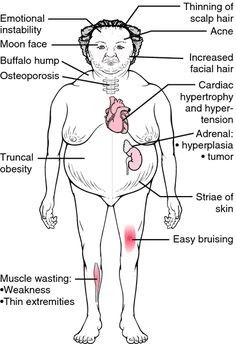The nurse is providing care to several patients in an outpatient clinic. Which patient is at highest risk of developing gastroesophageal reflux disorder (GERD)?
A patient who follows a strict vegetarian diet.
A patient who is morbidly obese
A patient who is 6 weeks pregnant.
A patient who drinks a glass of wine monthly.
The Correct Answer is B
Excess body weight, particularly in the abdominal area, can increase intra-abdominal pressure and lead to the weakening of the lower esophageal sphincter (LES). The LES is responsible for preventing stomach acid from flowing back into the esophagus. When it becomes weakened, it can contribute to the development of GERD. Other risk factors for GERD include certain dietary choices, such as consuming fatty and spicy foods, smoking, pregnancy, and alcohol consumption.

Nursing Test Bank
Naxlex Comprehensive Predictor Exams
Related Questions
Correct Answer is B
Explanation
Prednisone is a corticosteroid medication that can cause a range of side effects, including fluid retention, electrolyte imbalance, and increased blood pressure. A blood pressure reading of 148/94 mm Hg indicates hypertension, which may be related to the use of prednisone. It is essential to report this finding to the health care provider as it may require further evaluation and management, such as adjusting the medication dosage or initiating additional treatments to control blood pressure. The other information provided, such as stopping the medication, ankle edema, and not taking prescribed vitamin D, is relevant but does not pose an immediate threat to the patient's health compared to uncontrolled hypertension.

Correct Answer is B
Explanation
A blood glucose level of 40 mg/dL indicates severe hypoglycemia, which is a medical emergency requiring immediate attention. Hypoglycemia can lead to confusion, altered mental status, seizures, and loss of consciousness if not treated promptly. Therefore, it is crucial to assess and intervene quickly to raise the patient's blood glucose level to a safe range.
While the other clients mentioned also require attention and appropriate care, the severity and immediate risk associated with severe hypoglycemia make it the priority situation. The nurse should initiate appropriate treatment for hypoglycemia, such as administering glucose or glucagon, and closely monitor the patient's response.
Whether you are a student looking to ace your exams or a practicing nurse seeking to enhance your expertise , our nursing education contents will empower you with the confidence and competence to make a difference in the lives of patients and become a respected leader in the healthcare field.
Visit Naxlex, invest in your future and unlock endless possibilities with our unparalleled nursing education contents today
Report Wrong Answer on the Current Question
Do you disagree with the answer? If yes, what is your expected answer? Explain.
Kindly be descriptive with the issue you are facing.
